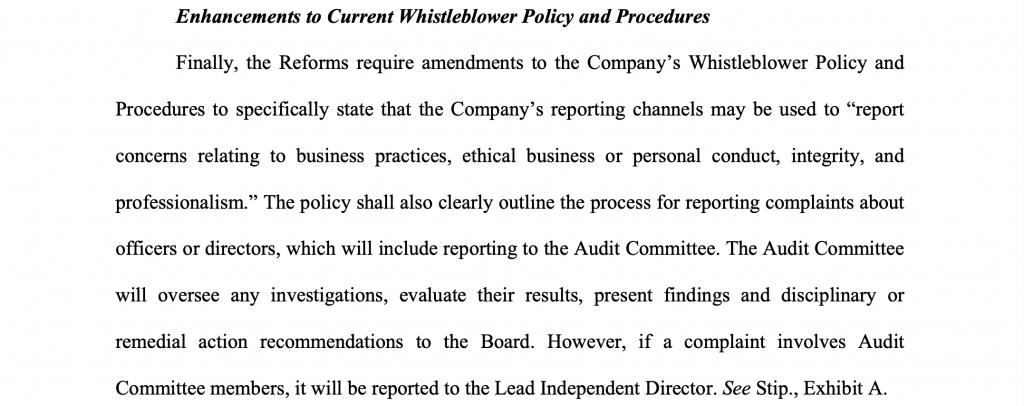THE FASHION LAW EXCLUSIVE – The RealReal will pay $11.5 million and make reforms to its corporate governance, including in connection with its authentication practices, whistle-blower policy, and oversight policy for “retail sales practices and customer relationships” in order to settle two ongoing shareholder lawsuits, assuming the two sets of plaintiffs get the green-light from the respective U.S. federal courts. As of this month, the plaintiffs in two separate matters filed against The RealReal have alerted courts in California and Delaware, respectively, that they have reached settlement agreements with the luxury reseller and its various directors and officers in developments that bring two headline-making cases closer to a final resolution following more than a year of litigation.
In the first case, which was filed in the U.S. District Court for the Northern District of California in November 2019, lead plaintiff Michael Sanders accuses The RealReal, its founder and CEO Julie Wainwright, former Chief Financial Officer Matt Gustke, Chief Accounting Officer Steve Lo, board members like Stefan Larsson, and the company’s IPO underwriters, including Credit Suisse Securities, B of A Securities, and UBS Securities, among others, (the “defendants”) of running afoul of federal securities laws.
Specifically, Sanders and fellow named plaintiffs Nubia Lorelle and Garth Wakeford allege that the defendants misled investors about the nature of The RealReal’s authentication process by making “false and misleading statements” in the offering documents issued in connection with its June 2019 IPO and in additional public statements made by the company thereafter.
For instance, the plaintiffs have claimed that despite The RealReal’s claims in its 2019 IPO filings that its “highly trained experts build trust in our buyer base by thoroughly inspecting the quality and condition of, and authenticating, every item we receive,” The RealReal “authentication process fell far short of this description” because the “vast majority of items supposedly ‘authenticated’ by [the company] were actually reviewed only by … low-wage hourly employees, often with little or no experience in fashion or luxury products.”
The “false and misleading statements and omissions of material fact” that The RealReal and its management allegedly made about its “purported authentication process” served to “artificially inflate” the price of its shares, the plaintiffs argue, and then damage those same shareholders “when the artificial inflation dissipated” following multiple media reports about the “true” nature of The RealReal’s authentication process.

In the unopposed motion for preliminary approval of settlement that they filed on November 5, the plaintiffs alert the court of the proposed settlement, which includes an $11 million sum to be shared among class members and their counsel. The plaintiffs contend that the scope of the settlement and corresponding release of the claims against the plaintiffs “is reasonable,” and that preliminary approval “is warranted because the settlement is the product of serious, informed, and non-collusive negotiations among experienced counsel and a highly-qualified mediator.”
Aside from arguing that the court should preliminarily approve the settlement, the plaintiffs are pushing the court to find that the action and the settlement class – i.e., all persons and entities who purchased The RealReal common stock from June 27, 2019 through November 20, 2019, and were damaged – are suitable for class certification. Ultimately, the plaintiffs have asked the court to schedule a settlement hearing “to determine whether the proposed settlement, proposed plan of allocation, and lead counsel’s motion for an award of attorneys’ fees and expenses and compensatory award to the plaintiffs should be approved.”
A hearing on the matter is slated for March 24.
The plaintiffs’ filing comes almost exactly three months after The RealReal reported its earnings for Q2, in connection with which it cited a $70.7 million net loss for the period, including “a charge of approximately $11 million that was recorded as an accrued legal settlement.” At the time, TRR did not reveal what case the settlement stemmed from; although, TFL noted at the time that it was likely tied to the Sanders case.
Derivative Action Against The RealReal
Not the only settlement on the horizon for The RealReal, also on November 5, plaintiffs Iwona Grzelak and Junior Aguirre filed an unopposed motion for preliminary approval of derivative settlement in the similar – but separate – consolidated cases that they filed last year, accusing the company’s board members and management of “intentionally or recklessly breaching their fiduciary duties” as directors and/or officers, and violating the U.S. Securities Exchange Act in the process.
In the corresponding support brief that they filed on November 5, Grzelak and Aguirre summarize the allegations at the heart of their case, asserting that while The RealReal has promoted itself – both in its IPO documentation and in subsequent statements by its management team – as “the world’s largest online marketplace for authenticated, consigned luxury goods,” its authentication operations were “nowhere near as robust as the defendants professed, and most items purportedly ‘authenticated’ by [TRR] were merely reviewed by TRR’s copywriters, who had minimal training or experience in fashion and authentication.”
As a result, the two plaintiffs claim that “hundreds of counterfeit items supposedly processed by the [The RealReal’s] rigorous authentication procedures were sold to [its] customers,” and all the while, “between June 27, 2019, and November 20, 2019, the individual [officer and management] defendants breached their fiduciary duties by making and/or causing the company to make a series of materially false and misleading statements and omissions regarding [its] authentication processes, risk exposure and purported growth and success, and by failing to maintain internal controls.”
Fast forward and following an attempt at mediation and three months of back-and-forth, the parties have reached an agreement on “the material terms of the settlement.” Now, before the U.S. District Court for the District of Delaware is a two-pronged settlement in furtherance of which TRR has agreed to “pay $500,000 to the plaintiffs’ counsel for their fees and expenses,” subject to court approval, and has agreed not to oppose “service awards” for the two plaintiffs to the tune of $1,500. Also at play are reforms, which “TRR, or its Board, as applicable, will implement … for no less than three years after the date upon which the court enters the final order and judgment.”
Specifically tailored “to address, and mitigate risk of the recurrence of, the misconduct alleged in” the case at hand, the reforms require TRR to make corporate governance improvements, including by “incorporat[ing] semi-annual assessments of all authentication staff and certifications into the company’s existing training programs” by TRR’s Chief Operating Officer, who will “oversee TRR’s training for staff engaged in authenticating TRR’s products;” and adopting a new policy for board oversight over the company’s retail sales practices and customer relationships, including “semi-annual reporting to the Board by the COO or its designee concerning oversight over TRR’s retail sales practices and the Company’s customer relationships.”

Beyond that, TRR will create a “management-level Risk and Compliance Committee to determine, implement, and assess TRR’s risk management policies and the operation of TRR’s risk management framework to identify TRR’s compliance risk exposure.” It will also make “amendments to [its] Whistleblower Policy and Procedures to specifically state that the company’s reporting channels may be used to ‘report concerns relating to business practices, ethical business or personal conduct, integrity, and professionalism.’”
The plaintiffs assert that the settlement reforms represent “a material and substantial improvement to TRR’s corporate governance and provide for new policies and procedures that will help to prevent a recurrence of the wrongdoing alleged” in the case at hand.
In asking the court to preliminarily “approve the settlement, direct the issuance of the notice of the settlement, and schedule the settlement hearing to consider final approval of the settlement,” the plaintiffs contend that the settlement “meaningfully addresses the issues [that they] raised in the consolidated action and provides an excellent resolution for TRR by way of the reforms.”
TRR confirmed the settlement developments on Monday, stating that stipulations of settlement are subject to preliminary and final approval by the courts. The company and individual defendants also assert that they “are entering into this Settlement solely to eliminate the uncertainty, distraction, disruption, burden, risk, and expense of further litigation, and without admitting any wrongdoing or liability whatsoever.”
The RealReal’s Third Quarter Results
In addition to news on the settlement front, TRR reported its Q3 results this week, posting revenues of $118.84 million for the 3-month period that ran through September 2021, up 53% compared to Q3 2020 and up 46% compared to Q3 2019. The luxury reseller revealed that its gross merchandise value (i.e., the value of the luxury goods that it sold during the quarter) increased by 50% and 46% compared to the same periods in 2020 and 2019, respectively. Meanwhile, for the 757,000 orders it processed during Q3, the average value amounted to $486, a 9% boost on a year-over-year basis.

Reflecting on the state of the business, CEO and founder Julie Wainwright said in a statement on Monday, “We believe the operational and supply impacts to our business from COVID-19 are effectively behind us, and we are well-positioned for a strong holiday season. Additionally, we believe The RealReal’s unique business model is largely insulated from the supply chain shortages and certain of the inflationary impacts many retailers are experiencing.”
Wainwright further asserted, “Overall, our business is experiencing very positive trends and we believe these trends will continue through the end of the year and into 2022. While we are in the early innings of delivering operating expense leverage, we believe the company is starting to see the benefits of our previous investments, which will create leverage as we drive toward profitability in the coming quarters.”
The cases are Sanders, et al. v. The RealReal, Inc., et al. 5:19-cv-07737 (N.D. Cal), and Iwona Grzelak v. Julie Wainwright, et al, 1:20-cv-01212 (D. Del.).
UPDATED (Nov. 10, 2021): Story has been updated to clarify that the stipulated settlement reforms refer to corporate governance and to make specific mention of a line in the stipulated settlement in which the defendants do not “any wrongdoing or liability whatsoever.”











